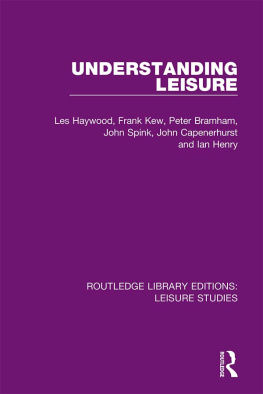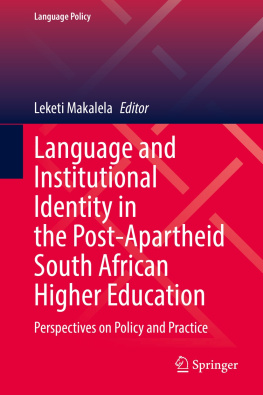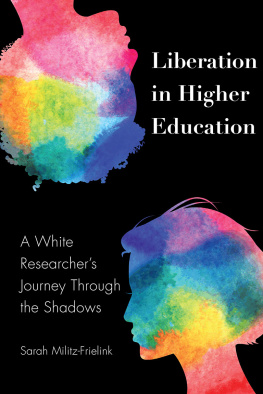Fun & Games & Higher Education
Fun & Games
& Higher Education
The Lonely Crowd Revisited
Randle W. Nelsen
Between the Lines
Toronto
Fun & Games & Higher Education
2007 by Randle W. Nelsen
First published in 2007 by
Between the Lines
401 Richmond Street West, Studio 277
Toronto, Ontario M5V 3A8
Canada
1-800-718-7201
www.btlbooks.com
All rights reserved. No part of this publication may be photocopied, reproduced, stored in a retrieval system, or transmitted in any form or by any means, electronic, mechanical, recording, or otherwise, without the written permission of Between the Lines, or (for photocopying in Canada only) Access Copyright, 1 Yonge Street, Suite 1900, Toronto, Ontario, M5E 1E5.
Every reasonable effort has been made to identify copyright holders. Between the Lines would be pleased to have any errors or omissions brought to its attention.
Excerpts from End Zone, by Don DeLillo, copyright 1972 by Don DeLillo: used by permission of Viking Penguin, a division of Penguin Group (USA) Inc.
Excerpts from Remembering Reuel Denney: Sociology as Cultural Studies, by Randle W. Nelsen, originally published in The American Sociologist 34, 4 (Winter 2003), 25-39: reprinted with kind permission of Springer Science and Business Media.
Cover images: front upper iStockphoto.com/Belinda . Stojanovic; front lower and back iStockphoto.com/Sandra Henderson
Cataloguing data available from Library and Archives Canada
ISBN 978-1-926662-09-1 (epub)
ISBN 978-1-926662-10-7 (PDF)
ISBN 978-1-897071-31-1 (print)
Cover design by Jennifer Tiberio
Text design and page preparation by Steve Izma
Between the Lines gratefully acknowledges assistance for its publishing activities from the Canada Council for the Arts, the Ontario Arts Council, the Government of Ontario through the Ontario Book Publishers Tax Credit program and through the Ontario Book Initiative, and the Government of Canada through the Book Publishing Industry Development Program.
Contents
Chapter 2 Cultural Studies
The Sociology of Reuel Denney
Chapter 3 The Party Hits the Road
A Ticket to Ride
Chapter 4 Big Games
The Decline of Lyric Sport
Chapter 5 Tailgating
A Feast of Strangers
Chapter 6 The Fourth Quarter
Higher Education Joins the Party
Chapter 7 Overtime
Distance Education, Sociability, and the Song of the Sirens
I AM WELL AWARE THAT SCHOLARSHIP, as I have argued in this book, is a social activity; hence the length of these acknowledgements. I do apologize if I have left anyone out who should have been included, and I thank you.
First and foremost, I express my deepest gratitude to my superb editor, Robert Clarke. This book as it now appears is not only different but also much improved from the draft manuscript he first saw. His organizational and writing skills (plus his good-natured ways of poking and prodding me out of complacency and into revisions and additions) have been literally transformative. Robs enthusiastic encouragement of this project was unflagging, and I cannot thank him enough for fitting me into his busy schedule.
Another key player has been my secretary, Karen Woychyshyn. As usual, she delivered in the clutch with unfailing good humour. Karen typed the initial draft and much subsequent revision, and also as one might expect from a friend offered sustaining good cheer when the work got me down. Thank you.
Four colleagues deserve special mention. My long-time pal David Peerla offered his usual sage advice, research skills, and acumen. Give David a question or a problem and he will find an answer. His curiosity and research scholarship are infectious and freely given as a friend. My friend and colleague Lisa Korteweg also proved most willing to exchange ideas and participant observation strategies with me. Her take on my observations and interpretations reveals a questioning mind that continues to illuminate. Similarly, Norene Pupo of York University, a friend and former student of mine at McMaster, has used her lively and critical mind to engage with my work for the past thirty-five years. Gary Genosko provided important bibliographic input and encouraged my renewed interest in popular culture. I thank him for giving me an opportunity to publish some of my early thinking with regard to the subject matter of this book.
I also want to thank long-time Lakehead colleague David A. Nock and Lawrence T. Nichols, editor of The American Sociologist, for their scholarly interest and advice. In addition, three other colleagues and former students of mine, Steve Bosanac, Walid Chahal, and Brian McMillan, have been generous and enthusiastic in their continuing support of my work.
This book took shape around the ideas found in the scholarship of Reuel Denney, who was my mentor more than forty years ago. Although it has now been a dozen years since he died, his thinking and diverse interests continue to provide intellectual stimulation and inspiration. Another Denney admirer and fellow graduate student from the 1960s whose friendship continues, Bin-ky Tan, along with his partner, Ruth Tan, encouraged me to re-examine Denneys work. I am grateful for this suggestion and the Tanss support; the result was a rekindling of some popular culture interests from our University of Hawaii days and Reuels classes.
I want to extend a big thank you to the staff and editorial collective of Between the Lines for their support and vision in being able to see the worthiness of the arguments presented here. Special thanks go to Paul Eprile and Steve Izma for their high-quality hard work and encouragement. It has been a pleasure working with you. I also received a warm and hospitable welcome from the staff at the Rauner Special Collections Library of Dartmouth College, where I worked with the Denney archives.
Finally, I want to recognize and thank both my extended and immediate family.
My cousin David Hanson, a University of Oregon Ph.D. who provided valuable insights concerning this research, and his partner, Susan Hanson, made my field trip to an Oregon Duck football game possible. It was great fun hanging out with them, and the childhood memories, laughter, good food (side trip to winery and beach included), and fellowship generously offered made this research trip a blast. My second family and long-time friends Charlie DeFalco and Diane Stevens and their children offered the usual warm support I have come to count on over the years. My daughters, Emilie and Rebecca, provided insight into many of the matters discussed herein. I especially want to thank Rebecca, seemingly headed into the family business of sociology, for her scholarly interest and exchanges regarding my ideas, and for rounding up and sharing some of her university friends in aid of my research.
Most important of all, I thank my partner of a quarter-century, Carol Ann Collins. She is a sustaining force in all I do. During the preparation of this book she was there for all the ups and downs that a writer-researcher goes through. She and her family, the Montreal clan, made the field trip to Dartmouth College memorable. Above all else, Carol Ann, as a principled and fun-loving feminist, offers me a daily role model to emulate and measure myself against. She is also the best storyteller I know, one who can always make me laugh. Thanks for everything, Carol Ann.
FOR ME, WRITING THIS BOOK HAS BEEN A LABOUR OF LOVE, the culmination of a desire to bring together my long-standing interests in higher education and popular culture in a manner that appeals not only to academics but also to other interested readers. I have been either a university student or a professor since I was eighteen years old forty-six years now and counting and this lifelong preoccupation with academic life has been a roller-coaster ride of stimulation and boredom. I must confess that more often than not I have found the writing of professional academics to be obtuse and tedious. Some early readers of this manuscript found it a bit too breezy or journalistic in style: code, perhaps, for being too accessible and not academic enough. Other readers pronounced it thought-provoking.








